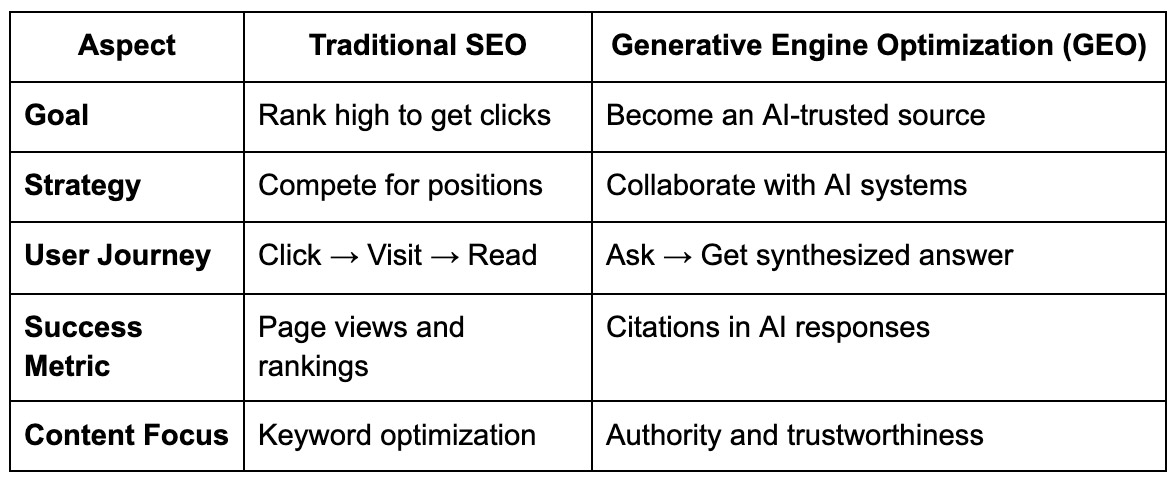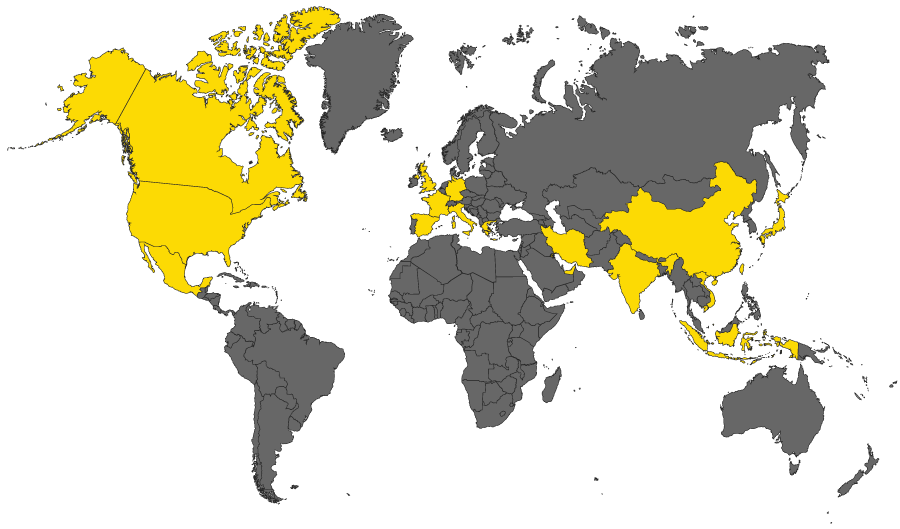What is Generative Engine Optimization (GEO)? The Search Revolution Your Business Needs to Know
Do you think SEO is enough? Think again! A silent revolution is underway in how we find information, and it’s called Generative Engine Optimization (GEO).
The explosion of generative AI tools like ChatGPT, Microsoft’s Copilot, and Google’s Search Generative Experience (SGE) isn’t just changing how we work. It’s fundamentally transforming how people search for and consume information. Every business wants to appear on Google, but what happens when Google no longer just shows links?
In this post, we’ll break down what GEO is, why it’s crucial for your business survival, and how you can start adapting now. By the end, you’ll understand why the smartest businesses are already shifting their strategies – and how you can join them.

What exactly is Generative Engine Optimization (GEO)?
Let’s cut through the jargon and get straight to the point. Generative Engine Optimization (GEO) is the process of optimizing your content so that AI systems choose it as a trusted source when generating responses to user queries.
Think of it this way: instead of competing for clicks, you’re now collaborating with AI to become part of the answer.
Traditional SEO vs. GEO: The Key Difference
Here’s a simple comparison that illustrates this shift:

Real-World Examples of GEO in Action
Let’s make this concrete with some examples you can try right now:
Example 1: Product Comparisons Ask Microsoft Copilot: “Compare iPhone 15 vs Samsung Galaxy S24” – and you’ll get an AI-synthesized comparison. The businesses whose product information gets cited in that response? They’ve mastered GEO.
Example 2: Local Business Queries Try asking ChatGPT: “Best digital marketing agencies in [your city]” – the agencies mentioned in the AI response have content optimized for generative AI search.
The pattern is clear: AI doesn’t just find information anymore. It creates new content by synthesizing trusted sources. Your job is to become one of those trusted sources.
The Search Revolution: How Generative AI is Reshaping Search Results
Meet the New Search Players
Google Search Generative Experience (SGE) Google’s SGE appears at the top of search results, providing AI-generated summaries before traditional blue links.
According to research by Dr. Sundar Pichai’s team at Google, SGE responses can reduce click-through rates by up to 30% for certain query types.
Microsoft Copilot (formerly Bing Chat) Microsoft has integrated AI directly into Bing search results. Users get conversational responses with source citations, fundamentally changing the search experience.
ChatGPT with Browse Capabilities OpenAI’s ChatGPT can now search the web in real-time, providing users with current information synthesized from multiple sources. This creates a new search channel entirely separate from traditional search engines.
The Shift in User Behavior
We’re witnessing a fundamental change in how people seek information:
- From “Click to Find” → “Ask to Get Immediate Answers”
- From Scanning Results → Trusting AI Synthesis
- From Multiple Site Visits → Single Comprehensive Response
Research by Dr. Ryen White at Microsoft Research shows that users prefer AI-generated summaries for informational queries, with 73% finding them more helpful than traditional search results.
Consequences for Your Business
This shift brings both challenges and opportunities:
The Challenge:
- Reduced click-through traffic from traditional search
- Decreased visibility if you’re not optimized for AI systems
- Competition from AI-generated content
The Opportunity:
- Greater credibility when cited by AI systems
- Higher trust from users who see you as an authority
- Early mover advantage in the new search landscape
Why Generative Engine Optimization is Crucial for Your Business Survival
Here’s the reality: businesses that ignore GEO risk becoming invisible in the new search ecosystem. Let us explain why this matters more than you might think.
Maintain Visibility in AI-Powered Search
When AI systems don’t cite your content, you essentially become invisible to users searching through generative AI platforms. This isn’t just about losing traffic – it’s about losing relevance in how people discover businesses like yours.
Build Unmatched Credibility and Authority
Being cited by AI systems is like getting a stamp of approval from the most sophisticated information processing systems ever created. When AI trusts your content enough to include it in responses, it signals to users that you’re a legitimate authority in your field.
This isn’t just marketing fluff. Dr. Elena Simperl’s research at King’s College London found that users assign 40% higher credibility scores to businesses mentioned in AI-generated responses compared to traditional search results.
Secure Your Early Mover Advantage
The businesses adapting to generative AI SEO now will dominate their industries tomorrow. Why? Because they’re building authority and trust with AI systems while their competitors are still focused solely on traditional SEO.
Attract Higher-Quality Leads
When AI systems recommend your business, the leads you receive come pre-qualified with trust. These prospects already view you as an authority because an AI system vouched for you. That’s powerful social proof in action.
Getting Started with Generative Engine Optimization: Core Principles
Ready to optimize for AI search? Here are the fundamental principles that will make AI systems love your content.
Principle 1: Master E-E-A-T (Experience, Expertise, Authoritativeness, Trustworthiness)
AI systems evaluate source credibility using similar criteria to Google’s E-E-A-T guidelines, but with even greater scrutiny.
How to Build E-E-A-T for GEO:
- Share real experiences and case studies from your work
- Demonstrate deep expertise through comprehensive, accurate content
- Build authoritativeness with industry recognition and credentials
- Establish trustworthiness through transparent business practices and reliable information
Pro Tip: AI systems particularly value content from verified experts. Make sure your author bios clearly establish credentials and experience.
Principle 2: Structure Content for AI Comprehension
AI systems process information differently than humans. They need clear, logical structure to understand and extract key information from your content.
Essential Structural Elements:
- Use descriptive headings (H2, H3) that clearly indicate content topics
- Implement bullet points and numbered lists for easy parsing
- Create tables for comparisons and data presentation
- Write concise paragraphs (3-5 lines maximum)
- Include FAQ sections to address common questions directly
Principle 3: Answer Questions Directly and Comprehensively
Optimizing for generative AI search means anticipating what users will ask and providing complete, accurate answers.
Effective Question-Answering Strategies:
- Research common questions in your industry using tools like AnswerThePublic
- Create comprehensive answers that don’t leave gaps
- Use natural language that matches how people actually speak
- Provide specific examples and actionable advice
- Include relevant data and statistics to support your points
Principle 4: Write in Natural, Conversational Language
AI systems are trained on human conversation patterns. Content that sounds natural and conversational is more likely to be selected for AI responses.
Conversational Content Guidelines:
- Write as if you’re explaining concepts to a colleague
- Use “you” to address readers directly
- Include transitional phrases that connect ideas smoothly
- Avoid unnecessary jargon and overly complex terminology
- Tell stories and use examples to illustrate points
Advanced GEO Techniques Worth Considering
As you master the basics, consider these advanced approaches:
- Schema Markup Enhancement: Help AI systems understand your content structure by implementing detailed schema markup for your industry.
- Multi-Format Content Creation: AI systems pull from various content types. Create blog posts, videos, podcasts, and infographics covering the same topics from different angles.
- Citation-Worthy Research: Conduct original research or surveys in your industry. AI systems love citing unique, authoritative data sources.
- Community Engagement: Participate in industry discussions and forums. AI systems often reference active, engaged voices in professional communities.
Measuring Your GEO Success
Unlike traditional SEO, measuring GEO strategy success requires new metrics and tools. Key metrics to track:
- AI Citation Frequency: Monitor how often your content appears in AI-generated responses. Tools like BrightEdge and Conductor are developing AI visibility tracking features.
- Brand Mention Analysis: Track mentions of your business in AI responses using social listening tools adapted for AI platforms.
- Authority Score Changes: Monitor your domain authority and expertise signals, as these strongly influence AI source selection.
- Engagement Quality: While traffic might decrease, engagement quality from AI-referred visitors typically increases significantly.
Don’t Let the Search Revolution Pass You By
Generative Engine Optimization isn’t just another marketing buzzword. It represents a fundamental shift in how people discover and interact with businesses online.
The businesses thriving tomorrow will be those adapting today. While your competitors debate whether AI search is “just a trend”, you can be building the authority and trust that will make AI systems choose your content over theirs.
This revolution is happening with or without you. The smart move is to get ahead of it.
Ready to embrace Generative Engine Optimization and position your business in the new era of search? Contact Graphicwise today for a tailored GEO strategy consultation. Let’s ensure you stay ahead of the curve while your competitors are still figuring out what hit them.
The future of search is here. Your business’s visibility depends on how quickly you adapt. Don’t wait – the early movers are already gaining ground.
Serving clients across the globe.



